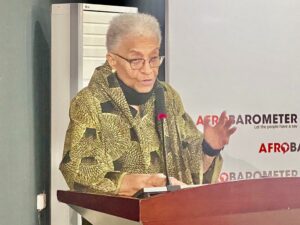
Ada, Greater Accra Region, Ghana//-Ex-president of Liberia, Madam Ellen Johnson Sirleaf has called for a greater emphasis on data-driven decision-making to help formulate evidence-based policies and programmes to speed up the socio-economic development of Africa.
According to her, as the African continent experiences significant economic growth and development, data has become an essential tool for policymakers and development practitioners seeking to track progress, identify areas for intervention, and make informed decisions that can impact the lives of millions of people.
Madam Sirleaf who made the call at the opening of a weeklong 2023 Afrobarometer Planning Meeting underway in Ghana, added: “Policymakers and practitioners need to be trained in the use of data, and there needs to be a greater emphasis on evidence-based policymaking.
This can be achieved through the development of data-driven decision-making frameworks, as well as through the establishment of partnerships between governments, academia, and civil society”.
To ensure that timely data becomes a reality in Africa, she also called for greater investment in data infrastructure and capacity building.
This includes building the technical and human capacity to collect, manage, and analyse data and investing in essential tools and technologies.
Madam Sirleaf who is a Member of Afrobarometer’s International Advisory Council was quick to add that the urgent need for greater recognition of the importance of timely data at all levels of society, is critical.
This she noted includes the development of public awareness campaigns that highlight the importance of data in the context of African development, as well as establishing mechanisms to ensure that data is used effectively to inform policymaking.
Delivering the keynote address titled: “Timely Data in the Context of African Development and Policy Decision Making” at well-attended meeting, Madam Sirleaf strongly believes that if these three measures are implemented, they would create new impetus for the phenomenal work Afrobarometer and its partners do.
She was confident that the impact of data-driven decision-making would be felt across the continent if the three measures are religiously taken on board.
Focus on promoting social inclusion and equality
The former Liberian leader did not mince words in acknowledging another aspect of Afrobarometer’s work that is dear to her heart – the focus on promoting social inclusion and equality.

“Through your surveys, you collect information on issues such as access to education, healthcare, and other basic services and attitudes towards minority groups and marginalised communities.
We all understand how such data can help promote social justice and reduce inequality, thereby contributing to a more inclusive and equitable society”.
Timely data is critical to the success of African development and policy decision-making. While significant challenges face the continent, progress is being made in many areas, we applaud the work of institutions like Afrobarometer”.
This is because their work has created a platform for African citizens to voice their opinions and concerns – that is by promoting a culture of transparency, accountability, and active citizenship in Africa.
“So, as you deliberate this week, I hope you do so, recognising the importance of your work and the task ahead. There is still much to be done if Africa must unlock the full potential of its data”, Madam Sirleaf said.

In speech read for Ghana’s Minister of Foreign Affairs and Regional Integration, Madam Shirley Ayorkor Botchwey, lauded Afrobarometer for its tremendous role it has played so far in the political discourse by making people’s voices significant in policy initiatives and decision-making at the national, continental and the global levels.
“Afrobarometer has become a household name in the continent’s quest for transparent and accountable governance”, she stated.
Grateful
In his welcome address, the Chief Executive Officer of Afrobarometer, Joseph Asunka, was grateful to the government for granting them permission to establish the headquarters of the continental research institution in Ghana.
Afrobarometer, which started its surveys in 12 countries in 1999, currently operates in 40 African countries. he said.
“Afrobarometer creates a platform for ordinary African citizens to continually make their views and experiences known to their elected representatives.
All of us gathered here are committed to this agenda, and we receive confirmation every day that governments and policy actors around the globe see the value of this work”.
He said the goal of Afrobarometer is to cover all countries on the continent as and when conditions allow.

“Having built a 12-country research project into a respected and trusted continental institution, we have a long list of achievements I could cite, most especially helping make citizens’ voice a pillar of African democracies”.
Mr Asunka indicated that the data they produce are a public good and are valued and used extensively around the globe.
Funding is critical
So, core or institutional funding is critical to the continued production of these data, and he hopes participants at the event will support them with advice and guidance on fundraising within and beyond the continent, including from private businesses that benefit or could benefit from the evidence Afrobarometer generates.
Three co-founders of Afrobarometer
The three co-founders of Afrobarometer who three professors are including Prof Emmanuel Gyimah-Boadi who had the vision, a quarter-century ago, to see Africa’s need for policy making informed by scientific data, shared their reflections during a panel discussion.
In all, the Round 10 Planning Meeting was attended by scores of Afrobarometer’s key partners- global, national, and continental from 40 African countries to design the upcoming round of surveys.
Activities of the five-day meeting according to the organisers involve plenary and working-group sessions to discuss and design survey instruments and methodologies, data quality assurance measures, and results dissemination strategies, among others.


